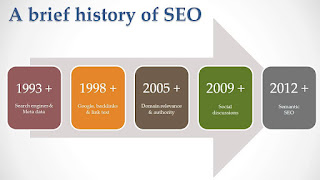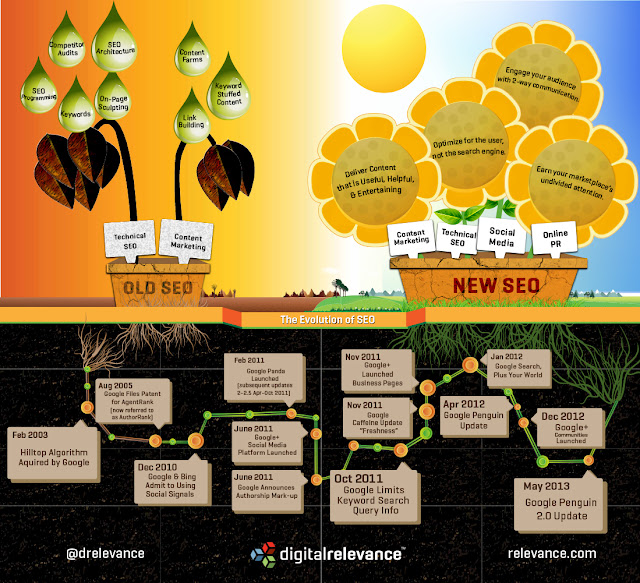"Google it" is the sentence that we probably hear and use every single day. Searching the internet using Google or another Search Engine is the activity that we all practice daily. So let us have a glance through the history and evolution of Search Engine. Its birth is speculated around 1991.
What is SEO?
Search Engine Optimization (SEO) is the task of influencing the online visibility of a website or a web page in a web search engine's results. It can be boiled down to 3 core elements crawling, caching and indexing for publishing the results. Crawling basically means following a path. SEO begins with crawl experience of Google bot, for example, crawls our site, details of which are recorded in a file within our server log files. Indexing is the process of adding web pages into Google search depending upon which meta tag you used(index or no-index). Caching helps you to improve the load time of your web pages and thus optimize your site for the search engines.
SEO practices can be broadly classified into two, ie, White hat and Black hat SEO. White hat SEO refers to the most genuine practices to gain higher page rank. They strictly stick into on to the Googles guidelines for SEO. Black hat SEOs look for loopholes in Googles algorithm in order to rank higher in the search engines.
SEO techniques adopted include On Page Optimisation and Off Page Optimisation. On page optimisation refers to the activities carried out in the page which is to be published. This activities helps in giving high ranking in the search engine result pages. Off page optimisation activities are done on a page after it become live on the web.
Where did SEO begin, and how did it become so darn important.Let us step back in time and try to unravel the story.
The idea for creating a chancery for all the World's data came to gratification in 1945. Dr. Vannevar Bush, then the director of Scientific Research and development(now defunct) had published a piece in The Atlantic putting forward collection of data and record. There is no evidence that Dr. Bush's article went into bringing forth of the search engine, but it would have planted a seed in the minds of tech heads of 90's.
Rise of SEO
As the number of users of internet increased, information can be attained with greater ease. But the quality of information provided was too low. To improve Page ranking site owners used Keyword stuffing -- repeating keywords over again and again. In addition to that, they also practiced spammy backlinks.
Sergey Brin & Lawrence Page need to par 2 hurdles when they begin the journey to create Google -- keyword stuffing and backlinks. In 1998, they bring forth Page Rank the technology that Google uses to attain the quality of the sites.
Updates of 2000 - 2002
Google AdWords ,Adsense and Google Toolbar were launched. With Google AdWords, a user can do the advertisement of their product. Using Google Toolbar people could search without visiting Google homepage. Adsense distributed the ads to the relevane places on the web page.Updates of 2003 - 2004
Many sites lost their ranking because of keyword stuffing because it emphasized mainly on quality content. In 2004 'Google Suggest' is introduced as a Google Labs feature.Updates of 2005
In the dawn of the year, to decrease the spammy links Google joined with Yahoo & MSN for the Nofollow attribute. Then in June, Google launched a personalized search, where it used users to search and browsing history. That November, Google Analytics got introduced, which is still used to measure traffic and campaign ROI(return on investment).Revamp of SEO in 2009
Bing premiered at the beginning of the year by providing better results than Google. In August, Google introduced Caffeine algorithm, that was designed to speed crawling, experiment the index and integrate indexation and ranking in nearly real time.Updates of 2010
We can see the suggestion from Google while we type for a query. These rolled out in September. In December, both Google and Bing added social signals.Panda Update
Google Panda update is a search filter introduced in February 2011. Its aim was content farming, content spinning. It also checks for content duplication, grammatical errors, spelling mistake
to lower the rank of low-quality sites or thin sites, in particular
Content Farming or Content mill is a website, where it's content is written for SEO bots instead of human readers. Topics for the sites are chosen to attain high ranking in search engine. Their aim is to create large revenue by laying down ads on the page or setting the links within the content.
Content Spinning is taking out a text written in one way, and rewriting it so that it sounds in another way.
Penguin Update
It rolled out in April 2012, real-time updation. It was an effort to avoid low-quality websites that give spammy links and keyword stuffing. Link Spamming include link exchange, link selling, and buying.Penguin also peeps out for:
Comment Spamming is by trying to get links to their websites by posting links to their websites by posting links to their sites everywhere. They also give the links in the comment space.
Wiki Spamming: Wikipedia is a site where everybody who can access the internet can edit the content. It is a very popular site since they are big non-profit sites. Before 2005, wikipedia.com never had added nofollow tag, so all links from it are counted as a valuable link to any site. But after that, it added a nofollow tag, so it tells the search engine not to pass any link power to that link. But there are still 100's of wikis that have not added nofollow tag and are subject to spamming.
Guest Blogging is a method where you can write an article for a website and get a link to your website/blog in return. It was a powerful strategy until Google's engineer Matt Cutts told to stop practicing Guest blogging as a way to get links.
Parked Domain Update
This rolled out on 12th April 2012. Parked domains is an alias domain for your primary domain. It will be pointing to the same web page. Imagine if someone queries for a brand name and if the search engine brings up the parked domains first, this activity will lessen the quality of the page.
Exact Match Domain
Google launched it as a filter on 28th September 2012 to prevent a low quality site from ranking high. Google caught the sites which had been developed with keywords that match search terms in their domain name and does not have upgraded to maintain the quality of web page.Humming Bird Update
Google updated its algorithm in September 2013. According to this
change, a search engine will pay more attention to the phrase rather than the keyword. Google will bring forth semantic search result. Google will give out the best matching result after the query. They had used Artificial Intelligence with algorithm while updating.
If majority opted for a specific answer for a query/forum. Then Google will go along with the majority even if it's the wrong answer. So its a drawback of Humming Bird Updation.
Rank Brain Update of 2015 was an updated version of Humming Bird. Here artificial Intelligence is was deeply used. Let see an example, if different age group people searched for a cordless mouse in a different manner. Google always try to give the result incorrect way. For Google plays as a person with high intelligence. This had also lead to voice search on mobile rather than typing.
Mobile Giddeon Updation(Mobile Friendly Updation)
By 2015 the number of mobile users increased drastically. By April 2015 Google also released new mobile-friendly ranking algorithm that's designed to give mobile-friendly pages in mobile search. To make a website/page highly ranked the design of the page must be more responsive. That is, there should not be horizontal scrolling. Also, the user would not have to tap the screen to read the content. If a user gets into a website using a specific mobile device using a specific mobile device then the website should be shown accordingly. Earlier it was mentioned that even if a page is not mobile friendly then also if it's rich in content then it may rank high. The latest update came in 2016 (Mobile Giddeon Updation 2.0).
If the sites don't open fastly then its ranking will be low by July 2018.
Hope you have got a brief idea on the history and evolution of search engine optimization. You can post the comments for more queries.
Mobile Giddeon Updation(Mobile Friendly Updation)
By 2015 the number of mobile users increased drastically. By April 2015 Google also released new mobile-friendly ranking algorithm that's designed to give mobile-friendly pages in mobile search. To make a website/page highly ranked the design of the page must be more responsive. That is, there should not be horizontal scrolling. Also, the user would not have to tap the screen to read the content. If a user gets into a website using a specific mobile device using a specific mobile device then the website should be shown accordingly. Earlier it was mentioned that even if a page is not mobile friendly then also if it's rich in content then it may rank high. The latest update came in 2016 (Mobile Giddeon Updation 2.0).
If the sites don't open fastly then its ranking will be low by July 2018.
Hope you have got a brief idea on the history and evolution of search engine optimization. You can post the comments for more queries.
Hope you have got a brief idea on the history and evolution of search engine optimization. You can post the comments for more queries.





No comments:
Post a Comment